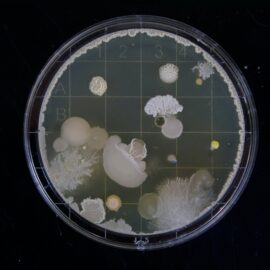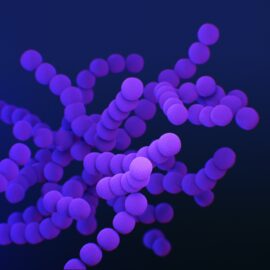

This article gives you a glimpse of what you can learn with Shortform. Shortform has the world’s best guides to 1000+ nonfiction books, plus other resources to help you accelerate your learning.
Want to learn faster and get smarter? Sign up for a free trial here .
What are the top nutrition myths that most people believe? And how did we come to believe them, especially when information is so freely available?
With so much nutrition information floating around on the web, it can be hard to sift out the truth. Nutrition myths are everywhere—your social media feed, your favorite fitness blog, even your doctor’s office.
Here, we bust the top five nutrition myths to help you make better food choices starting today.
The Nutrition Space Is Ripe With Myths
The Internet is rife with misinformation, especially on highly contested topics such as health and nutrition. No wonder, nutrition myths have spread like wildfire among the public.
Some of these myths have become so entrenched that people treat them almost like gospel. And the longer the myth has been around, the harder it is to get people to question it.
And yet, hope remains. Thanks to doctors and scientists who aren’t afraid to bring “conventional wisdom” about nutrition under scrutiny, nutrition myths are slowly but surely dying out.
Here are five popular nutrition myths debunked.
Myth 1: It’s All About Nutrients
One of the most entrenched nutrition myths is that the health value of food is based solely on its nutritional make-up. In his book In Defense of Food, Michael Pollan attributes this idea to the rise of what he calls “nutritionism.” The focus of nutritionism is on isolating certain nutrients—proteins, carbohydrates, certain fats, and antioxidants—as the cause of either good or bad health.
However, when we only consider foods as valuable for their nutrient make-up, we ignore the internal workings of whole foods. An example of this short-sightedness is the current state of milk. Milk has become nothing more than a vessel for delivering protein, lactose, fat, and calcium. For decades, food science has attempted to simulate the beneficial effects of these nutrients in milk-like substances. From German scientist Justus von Liebig’s first attempt to develop a suitable baby formula, several other iterations have entered the market. However, despite the changing compositions of ingredients and added nutrients, there has never been a time when babies fed formula have thrived as well as those given human milk. If baby formula has the same chemical compounds as milk, it should react similarly in the body. But it doesn’t because nutrients tell only part of the story.
Myth 2: The Saturated Fat Myth
Among doctors and laymen alike, there is a popular assumption that saturated fat clogs up arteries, leading to coronary heart disease. The origin of this idea can be traced back to the birth of the “lipid hypothesis.” The lipid hypothesis states that fat and cholesterol, mostly from meat and dairy, lead to increased rates of heart disease. The evidence came from assumptions made about health and eating habits surrounding WWII. Scientists believed that meat and dairy rationing during the war was related to low rates of heart disease. Likewise, rising rates after the war were linked to Americans resuming normal eating habits. This claim was supported by evidence of the low rates of CHD in other cultures that ate mostly plant-based diets.
But saturated fat is not as unhealthy as we’ve been made to believe. The relationship between CHD and meat and dairy consumption during the war is actually more complex. During the war, eating habits were very different in other ways too: people ate less, in general, and fewer refined carbohydrates. People also ate more fish and got more exercise from walking due to a lack of gasoline. Finally, regarding the lower CHD rates in other cultures, it was entirely likely that those cultures had different customs surrounding food, ate fewer calories, and led different lifestyles that included more exercise.
Finally, only a few studies ever found a positive correlation between saturated fats and coronary heart disease (CHD).
Myth 3: Fat Makes You Fat
This is another fat myth that still guides many people’s food choices: that eating fat makes you fat. On the surface, it seems logical that eating less dietary fat would result in less bodily fat. However, as it turns out, eating dietary fat does not cause you to store more bodily fat. According to research, high-fat diets are actually less fattening compared to high-sugar diets that are identical in calories.
Moreover, certain types of fats have been found to be more fattening than others. Specifically, increasing the intake of saturated and trans fats has been found to promote weight gain, while upping the intake of unsaturated fat had no effect at all. This is because different types of fat act differently in the body. Saturated and trans fat seem to trigger insulin resistance, preventing your cells from absorbing glucose, which in turn, leads to further release of insulin—a fat-storage hormone.
Myth 4: The Calories In, Calories Out Myth
The ‘calories in, calories out myth’ is another entrenched myth that still guides our food choices. While two foods that contain an equal number of calories do indeed contain the same amount of energy, they don’t have the same metabolic effect on the body.
To understand why a calorie is not just a calorie, consider fiber. Fiber passes through the body without metabolizing. Therefore, the number of calories you consume won’t be the same as the amount you absorb. For example, if you eat 200 calories of lentils, which are high in fiber, you may only absorb 170.
Myth 5: The Vitamin Myth
It’s no secret that vitamins and minerals are essential for the optimal functioning of the body. It’s also no secret that you don’t actually need to consume food to get vitamins into your body. All you need to do to reap the benefits of vitamins is to pop a pill, right?
As it turns out, supplements are not the solution to our vitamin needs. In research studies, eating health supplements doesn’t have as positive an effect as whole foods. This might be because whole foods contain many other benefits, such as fiber and other micronutrients. Supplement extracts also introduce the risk of contaminants and toxicity.
To reap the goodness of vitamins, your best bet is to eat a diet that includes a variety of fruits and vegetables. Use supplements for their intended purpose—to supplement a healthy diet, not substitute it. According to Steven Gundry, the author of The Plant Paradox, these are the most important supplements:
B vitamins: Vitamin B helps reduce levels of a particular amino acid that can damage your blood vessel lining. Your gut bacteria produce many B vitamins, so if your gut bacteria have been compromised by any of the disruptors we discussed earlier (e.g. antibiotics and NSAIDs), you’re probably deficient in methylcobalamin (vitamin B12’s active form) and methylfolate (folic acid’s active form); in addition, more than half the people in the world have a gene mutation that inhibits their production of these two vitamins.
Long-Chain Omega-3s: Omega-3s are fatty acids that are essential to memory and brain health. You get omega-3s from fish, but few people eat enough fish to get a sufficient amount, so supplement with fish oil that contains DHA.
Phytochemicals: The phytochemicals in leafy greens nourish your good microbes and ease your cravings for foods that feed bad microbes. Besides eating lots of leafy greens, you can increase your phytochemical intake with:
- Diindolylmethane (DIM)
- GundryMD Primal Plants (created by the author)
- Modified citrus pectin (powder or capsules)
- Spinach extract
Polyphenols: Polyphenols nourish your good microbes, dilate your blood vessels, and prevent an artery-clogging molecule from forming from certain animal proteins. You can get polyphenols from:
- Berberine
- Cinnamon
- Cocoa powder
- Grape seed extract
- Green tea extract
- Mulberry
- Pine tree bark extract
- Pomegranate
- Resveratrol (the polyphenol found in red wine)
- Vital Reds (created by the author)
Prebiotics: Prebiotics feed the probiotics—or microbes—in your holobiome, while starving the bad microbes. Recommended prebiotics include:
- Fructooligosaccharides (FOS)
- Galactooligosaccharides (GOS)
- GundryMD PrebioThrive (created by the author)
- Inulin powder, a type of FOS
- Psyllium husks
Vitamin D3: Vitamin D is vital to helping your body absorb calcium, but the standard American diet leaves most people vitamin D deficient.
Final Words
The only rule about eating that you need to understand is that you should eat mostly plant-based real food in moderation. This idea is simple enough and should be easy to follow. What has prevented us from following this simple principle are the nutrition myths that still permeate our thinking despite the advances in science and free access to information.
We’ve detailed the most entrenched nutrition myths, but it’s certainly not an extensive list. Do you know any other, perhaps lesser-known, nutrition myths that should be brought to public attention? Let us know in the comments!
Recommended Reading
If you want to learn more about nutrition myths and how they’ve come to permeate public consciousness, check out the following books from our library:
The Plant Paradox
From the low-carb, high-fat keto diet to whole-foods-based paleo diet, there are countless eating programs promising to help you lose weight and be healthier. The Plant Paradox Program (PPP) is an eating and lifestyle program based on the way foods and products affect your body and immune system; it involves eating lots of the right plants, while avoiding others, in order to reach and maintain a healthy weight and live free of chronic and autoimmune diseases. The program is based on the premise that small things can cause big problems and the key to your health is less about what you add to your diet and more about what you remove.
How Not to Die
Picture the end of your life. Do you want to die from heart disease? Cancer? Diabetes?
In How Not to Die, Michael Greger argues that a plant-based, whole-food diet has been scientifically shown to reduce the most common diseases leading to death. He then gives his recommendation for “The Daily Dozen” foods to eat to maximize health benefits.
In Defense of Food
American society is inundated with food. There are thousands of options of what to eat and a myriad of ways to eat it. So why does food need defending? In his book In Defense of Food, Michael Pollan distinguishes between real food and processed food and how the reliance on the latter leads to a society plagued by Western diseases.
From our reliance on industry and science to dictate what we should and shouldn’t eat to the loss of traditional food cultures, the Western diet has wreaked havoc on Americans and created one of the unhealthiest societies in the world. But we can reverse the damage if we repair our relationship with food and support the health of the food chain.
The Omnivore’s Dilemma
The Omnivore’s Dilemma by Michael Pollan explores how we answer the question, “What should we eat.” It traces four types of food chains from a food’s origin to the dinner table. He focuses on how food production in the U.S. has evolved from small farms to a mass production system of huge corn and animal farms operated on factory-based principles. This system has produced cheap, tasty but less healthy foods while making it difficult for us to make better choices by obscuring our food’s origins and ingredients.
We have a viable alternative in true organic food, but to make better choices and influence change we must do the work of educating ourselves and giving up our addiction to convenience and unhealthy foods.
The China Study
Americans might be the heaviest, sickest people in the world. The China Study suggests that we can lose weight and lower disease rates by removing animal foods from our diets.
What sets the whole foods, plant-based diet apart from the fads is the extensive research behind it, detailed and distilled in this book. The evidence is compelling and the message is clear: Animal foods lead to disease; plant foods prevent and treat it. Learn how a plant-based diet can give you more energy, reverse your heart disease, decrease your cancer risk, outsmart your genes, and make your life longer and healthier.

Want to fast-track your learning? With Shortform, you’ll gain insights you won't find anywhere else .
Here's what you’ll get when you sign up for Shortform :
- Complicated ideas explained in simple and concise ways
- Smart analysis that connects what you’re reading to other key concepts
- Writing with zero fluff because we know how important your time is






